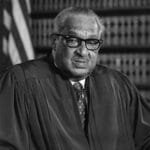 Sherman Minton, appointed by President Harry S. Truman in 1949, brought a wealth of legislative and judicial experience to the Supreme Court. As an Associate Justice, Minton was known for his pragmatism, loyalty to his Democratic roots, and commitment to judicial efficiency.
Sherman Minton, appointed by President Harry S. Truman in 1949, brought a wealth of legislative and judicial experience to the Supreme Court. As an Associate Justice, Minton was known for his pragmatism, loyalty to his Democratic roots, and commitment to judicial efficiency.
Early Life and Career
Sherman Minton was born on October 20, 1890, in Georgetown, Indiana. After graduating from Indiana University and Yale Law School, Minton served in the U.S. Army during World War I. His career in public service began in earnest when he was elected to the U.S. Senate in 1934 as a New Deal Democrat.
During his time in the Senate, Minton was a staunch supporter of President Franklin D. Roosevelt’s policies, including the controversial court-packing plan. After losing his Senate seat in 1940, Minton was appointed to the U.S. Court of Appeals for the Seventh Circuit, where he developed a reputation for judicial efficiency and fairness.
Tenure on the Supreme Court
When Justice Wiley Rutledge passed away in 1949, President Truman nominated Minton to the Supreme Court. His confirmation was swift, reflecting bipartisan respect for his qualifications and experience.
- Support for Judicial Restraint
Minton’s judicial philosophy emphasized restraint and deference to legislative decisions. He believed the judiciary should not interfere with the democratic process unless absolutely necessary. This perspective aligned with his legislative background and commitment to respecting the role of Congress. - Notable Opinions
While Minton rarely authored landmark opinions, his votes were pivotal in shaping the Court’s direction during his tenure. He often sided with the majority in cases upholding federal authority and New Deal policies.
For example, in Youngstown Sheet & Tube Co. v. Sawyer (1952), Minton joined the majority in striking down President Truman’s seizure of steel mills during the Korean War, emphasizing the importance of checks and balances.
- Civil Rights Stance
Minton supported the early civil rights decisions of the Vinson and Warren Courts, including Brown v. Board of Education (1954). Although not a leading voice on the issue, his votes reflected his belief in gradual progress toward racial equality within the framework of constitutional law. - Retirement and Legacy
Health issues prompted Minton to retire in 1956, ending a distinguished career in public service. He passed away in 1965, remembered as a loyal Democrat, a pragmatic jurist, and a bridge between the legislative and judicial branches.








